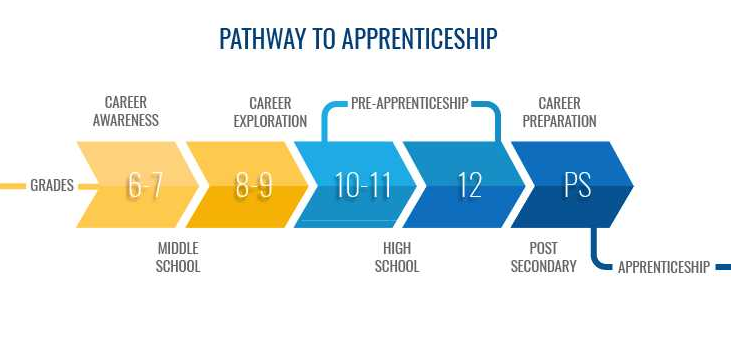Apprenticeship can play a valuable role in preparing students for future careers in a competitive economy. Students can begin preparing for a career pathway that includes apprenticeship as early as middle school. The trajectory can be conceptualized in three phases: Career Awareness, Career Exploration and Career Preparation.

Middle School – Career Awareness
Middle school is a great time to engage students in career awareness by providing students with opportunities, helping them discover outlets and resources that explore the idea of work, and providing realistic ideas of careers in a dynamic economy that is constantly changing and becoming more technologically advanced.
High School – Career Exploration
Once in high school, students can begin to apply their understanding of work to explore career pathways through work-based learning opportunities, such as apprenticeship. ApprenticeshipNC refers to all high school apprenticeships as pre-apprenticeships.
Pre-Apprenticehip
Pre-apprenticeship connects school-based learning with the workplace to integrate core and technical instruction. As opposed to full apprenticeships, pre-apprenticeships offer shorter training programs that allow participants to explore an industry before they decide to join it. In addition, pre-apprenticeship participants can decide to either learn in the classroom, gain on-the-job experience, or pursue both at the same time. If participants are planning to continue apprenticeship training, they can also earn credit that can carry over to their particular field of interest.
While students can pursue pre-apprenticeship training while they are still in school, programs for out-of-school youth are often sponsored by community organizations that work with apprenticeship sponsors or other employers to address behavioral, economic and other barriers to employment of youth who do not have a career path.
Apprenticeships for high school students complement other career initiatives in North Carolina:
NCWorks Certified Career Pathways
NCWorks Certified Career Pathways are integrated systems of development programs that ensure the training individuals receive meets the present and future needs of businesses. Pre-apprenticeships and apprenticeships satisfy the work-based learning criteria for a career pathway.
NC Secondary Career and Technical Education and Work-Based Learning
Career and Technical Education imparts students with the skills they need to be successful citizens, workers and leaders in a global economy. Work-based learning, a key curriculum component within CTE, provides students with practical work experience where they can apply academic and technical skills and develop employability skills. Apprenticeships are included as a work-based learning strategy for CTE.
Career & College Promise
Career & College Promise is North Carolina’s dual enrollment program for high school students, where eligible high school students can enroll in college classes at North Carolina community colleges and universities. In many cases, students can earn college credit and meet high school graduation requirements through college courses. High school students in apprenticeships are eligible for CCP.
Postsecondary – Career Preparation
Once a student graduates from high school, they are eligible to participate in an ApprenticeshipNC registered apprenticeship. Students who graduate from a high school pre-apprenticeship are eligible for additional benefits during their registered apprenticeship, including:
- Tuition Waiver: Students who start in a qualifying apprenticeship program while in high school and enroll in a registered apprenticeship program within 120 days after graduation qualify for the youth apprenticeship tuition waiver at the community college.
- Transfer of College Credits: Credits earned in college courses taken during high school through certified Career & College Promise pathways can be applied toward a community college degree.
- Career Advancement: Apprenticeships are increasingly aligned with higher education goals depending on student interests.
